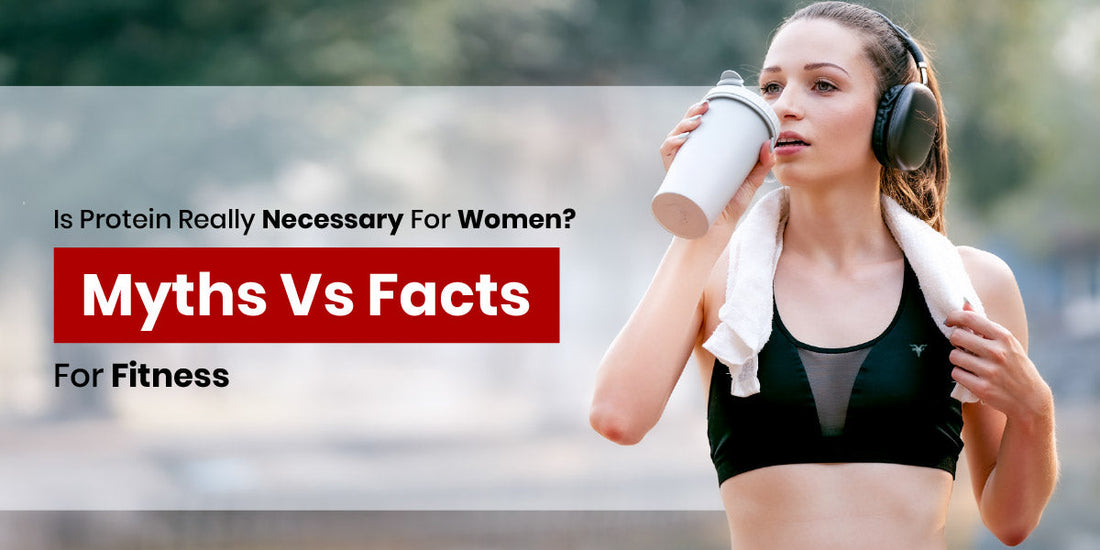
Is Protein Really Necessary for Women? Debunking Myths and Revealing Facts
byIn today’s world of health and wellness, one of the most commonly misunderstood topics is protein—especially in relation to women. There’s a prevailing belief that protein is mainly for men or hardcore gym-goers.
As a result, many women unknowingly miss out on the profound benefits of adequate protein intake. From supporting hormonal balance to promoting lean muscle tone, protein is an essential nutrient for every woman—regardless of her fitness level.
This comprehensive guide is designed to bust myths, explain facts, and guide women in making informed choices about their protein consumption. Whether you’re a working professional, a mother, a fitness enthusiast, or a student—this article is tailored to empower you with knowledge and clarity.
Myth 1: Protein Makes You Bulky
One of the most common fears among women is that consuming more protein will lead to an overly muscular or bulky physique. The truth is, building muscle bulk requires a combination of heavy strength training, calorie surplus, and often years of consistent training. For most women, especially those in a calorie deficit or maintenance, protein helps develop lean muscle mass, tones the body, and boosts metabolism without adding bulk.
Myth 2: Women Don’t Need as Much Protein as Men
While it's true that men typically have higher caloric needs due to greater muscle mass, many women still require substantial protein—especially those who are physically active, pregnant, breastfeeding, or aging. Protein supports tissue repair, bone density, and hormonal balance. Women in their 30s and beyond benefit greatly from increased protein intake to maintain muscle mass and combat age-related loss (sarcopenia).
Myth 3: Protein is Only Important if You Exercise
Protein is a foundational macronutrient necessary for the daily repair of tissues, enzyme production, hormone regulation, and immune function. Even women who don’t engage in regular workouts need protein to maintain healthy skin, hair, nails, and internal functions. Active women require even more to recover from workouts and prevent fatigue.
Myth 4: Plant-Based Diets Cannot Meet Protein Needs
Plant-based eating can absolutely support adequate protein intake when approached with intention. Foods like tofu, lentils, quinoa, soy, seitan, chickpeas, and nuts provide all or most essential amino acids. Many women on plant-based diets use clean, organic protein powders to supplement their intake and ensure they meet daily goals.
How Much Protein Do Women Really Need?
For protein, 0.8 grams per kilogram of body weight is the recommended dietary allowance (RDA). However, that number is the minimum to prevent deficiency—not the optimal intake for active or health-conscious individuals.
Here’s a breakdown based on activity level:
|
Activity Level |
Recommended Protein Intake (grams per kilogram of body weight) |
|
Sedentary (minimal activity) |
0.8 – 1.0 g/kg |
|
Moderately Active |
1.0 – 1.2 g/kg |
|
Active (regular workouts) |
1.2 – 1.5 g/kg |
|
Athletes / Intense training |
1.5 – 2.0 g/kg |
For example, a moderately active woman who weighs 60kg would need around 72g of protein daily. This number increases during pregnancy, lactation, or weight loss.
Top Protein Sources for Women
A balanced protein intake comes from both animal and plant-based options. The following are some of the most nutrient-dense sources:
- Fish (such as salmon and tuna), turkey, and chicken breast
- Eggs and egg whites
- Greek yogurt and cottage cheese
- Lentils, chickpeas, and kidney beans
- Tofu, tempeh, and soy milk
- Quinoa and whole grains
- Almonds, peanuts, chia seeds, flax seeds
- Whey and plant-based protein powders
When Should Women Consume Protein?
Protein timing can influence muscle recovery, metabolism, and satiety. Key times include:
- Morning: Prevent muscle breakdown after overnight fast
- Post-Workout: Promote muscle repair and reduce soreness
- Time to go to bed: Use slow-digesting proteins, such as casein, to aid in nighttime recovery.
- Between meals: Control cravings and maintain energy
Final Thoughts
It’s time to stop fearing protein and start embracing it. For women, protein is a tool for empowerment—not just physically, but metabolically and hormonally as well. It doesn’t lead to bulkiness; Strength, resilience, healthier skin, stronger bones, and sustained energy are the results, not bulkiness. Regardless of your lifestyle, age, or dietary preference, make protein a staple in your daily nutrition to live stronger and healthier.









